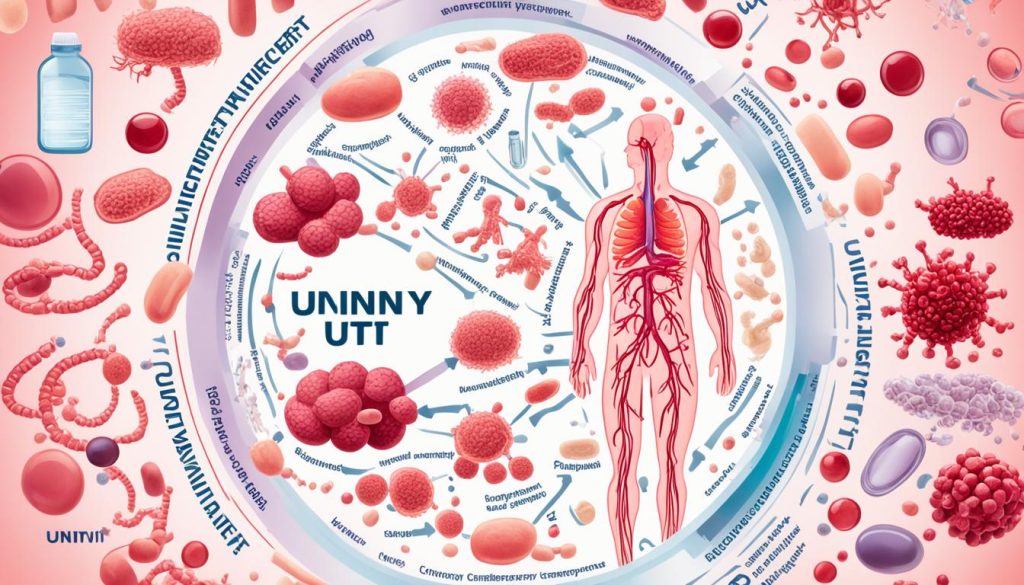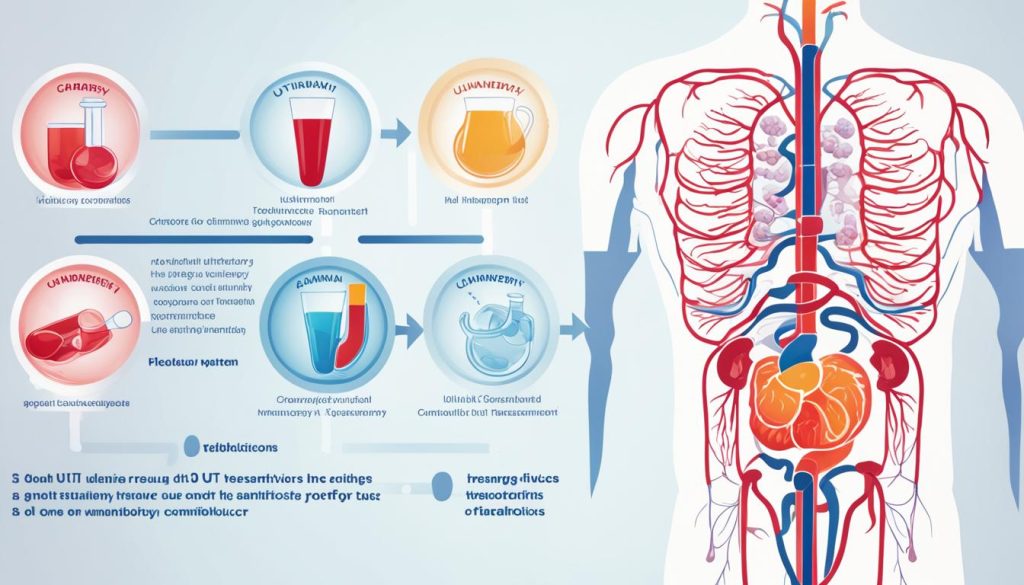A urinary tract infection (UTI) is a common condition that can cause discomfort and pain. While antibiotics are the most effective treatment for UTIs, there are also several home remedies and preventive measures that can help manage symptoms and reduce the risk of recurrent infections.
In this article, we will explore effective tips on how to get rid of a UTI and discuss UTI treatment options, including antibiotic therapy and natural remedies.
What Causes UTI?
Urinary tract infections (UTIs) occur when bacteria enters the urinary tract. The primary culprit behind UTIs is Escherichia coli (E. coli), a type of bacteria commonly found in the gastrointestinal tract. However, several factors can contribute to UTIs:
- Poor Hygiene: Improper wiping or inadequate cleansing of the genital area can introduce bacteria into the urinary tract.
- Sexual Activity: Sexual intercourse can increase the risk of UTIs, especially in women, due to the proximity of the urethra to the anus and the potential for bacteria transfer.
- Urinary Tract Abnormalities: Structural abnormalities in the urinary tract, such as urinary obstructions or urinary reflux, can make individuals more susceptible to UTIs.
- Menopause: The decline in estrogen levels during menopause can lead to changes in the urinary tract lining, making it more vulnerable to bacterial infections.
- Use of Certain Birth Control Methods: Certain types of birth control, such as diaphragms or spermicides, may increase the risk of UTIs by altering the natural protective barrier of the urinary tract.
Understanding the underlying causes of UTIs is crucial for developing effective prevention and treatment strategies. By addressing these risk factors and adopting proper hygiene practices, individuals can reduce their chances of developing UTIs.

| Causes of UTIs |
|---|
| Poor hygiene |
| Sexual activity |
| Urinary tract abnormalities |
| Menopause |
| Use of certain birth control methods |
Symptoms of UTI
A urinary tract infection (UTI) can cause various symptoms depending on which part of the urinary tract is affected. It is important to be aware of these symptoms in order to seek timely medical attention for proper diagnosis and treatment.
Common Symptoms of UTI
- Frequent urination
- Burning sensation during urination
- Cloudy or strong-smelling urine
- Pelvic pain
- Fatigue
In women, UTIs can also cause pelvic discomfort and irritation. Recognizing these symptoms is crucial, as untreated UTIs can lead to more severe complications such as bladder or kidney infections. Seeking medical attention promptly can help prevent such complications.
It is important to note that symptoms may vary in severity and may not always be present in every case of UTI. Some individuals may experience mild symptoms, while others may have more pronounced discomfort. If you suspect you may have a UTI, it is recommended to consult with a healthcare professional for proper diagnosis and treatment.

| UTI Symptoms | Description | |
|---|---|---|
| Frequent urination | The need to urinate more often than usual | |
| Burning sensation during urination | A painful or stinging feeling while passing urine | |
| Cloudy or strong-smelling urine | Urine that appears cloudy or has a strong odor | |
| Pelvic pain | Pain or discomfort in the lower abdomen or pelvic area | |
| Fatigue | Feeling tired or lacking energy | |
| Discomfort and irritation in women | Pelvic discomfort and irritation specific to women | |
How to Get Rid of a UTI?
UTI Treatment Options
The most effective treatment for UTIs is antibiotic therapy, which is prescribed by a healthcare professional. Commonly prescribed antibiotics for UTIs include trimethoprim-sulfamethoxazole, nitrofurantoin, and fosfomycin. The choice of antibiotic depends on factors such as the severity of the infection and the patient’s medical history.
In some cases, low-dose antibiotics may be prescribed for long-term use to prevent recurrent UTIs. It is important to complete the full course of antibiotics as prescribed and follow up with a healthcare professional if symptoms persist or worsen.
| Antibiotic | Recommended Dosage | Side Effects |
|---|---|---|
| Trimethoprim-sulfamethoxazole | One double-strength tablet twice daily for 3 days | Nausea, vomiting, rash |
| Nitrofurantoin | One capsule twice daily for 5 to 7 days | Nausea, diarrhoea, headache |
| Fosfomycin | One sachet once as a single dose | Diarrhoea, abdominal pain, skin rash |
In addition to antibiotics, there are also over-the-counter UTI relief medications available, such as urinary pain relief tablets and cranberry supplements. These can help manage symptoms but should not be used as a substitute for antibiotic treatment.

Home Remedies for UTI
In addition to medical treatment, there are several home remedies that can provide relief from UTI symptoms and aid in recovery. These remedies are natural, easily accessible, and can be used in conjunction with prescribed medications. Here are some effective home remedies for UTI:
1. Stay Hydrated
Drinking plenty of water is crucial when dealing with a UTI. It helps to flush out bacteria from the urinary tract and promotes urine production, which can help alleviate symptoms. Aim to drink at least 8-10 glasses of water per day.
2. Use a Heating Pad
A heating pad can provide relief from the discomfort and pain associated with a UTI. Apply a warm compress to your lower abdomen to soothe the area and reduce inflammation. Make sure to use a cloth or towel between the heating pad and your skin to avoid burns.
3. Take Probiotics
Probiotics are beneficial bacteria that can help restore the natural balance of bacteria in the urinary tract. Consuming probiotic-rich foods like yogurt or taking over-the-counter probiotic supplements may help prevent recurrent UTIs.
4. Increase Vitamin C Intake
Vitamin C can boost your immune system and help fight off the infection. Include foods rich in vitamin C, such as oranges, strawberries, and bell peppers, in your diet. You can also take vitamin C supplements, but consult your healthcare professional for the appropriate dosage.
5. Practice Good Hygiene
Practicing good hygiene is crucial in managing and preventing UTIs. Always wipe from front to back after using the toilet to prevent bacteria from the rectum from spreading to the urethra. Avoid using harsh soaps, douches, or feminine hygiene sprays that can disrupt the natural balance of bacteria in the urinary tract.
While some home remedies like cranberry juice have been traditionally recommended for UTI prevention, the scientific evidence supporting their efficacy is mixed. It is important to consult with a healthcare professional before trying any home remedies to ensure they are safe and suitable for your specific condition.

| Home Remedies for UTI | Effectiveness |
|---|---|
| Drinking plenty of water | Can help flush out bacteria and provide relief |
| Using a heating pad | Can alleviate discomfort and reduce inflammation |
| Taking probiotics | May help restore healthy bacteria in the urinary tract |
| Increasing vitamin C intake | Can boost immune function and aid in fighting the infection |
| Practicing good hygiene | Important in preventing the spread of bacteria |
While home remedies can provide temporary relief, they are not a substitute for medical treatment. If your symptoms persist or worsen, it is important to consult with a healthcare professional for proper diagnosis and treatment.
Preventing UTIs
Preventing UTIs is crucial for those who are prone to recurrent infections. By following these uti prevention tips, you can significantly reduce the risk of UTIs and maintain urinary tract health.
Hydration
Staying hydrated is key to preventing UTIs. Drinking plenty of water helps flush out bacteria from the urinary tract. Aim to consume at least 8 glasses of water per day to maintain optimal hydration levels.
Complete Bladder Emptying
When urinating, make sure to empty your bladder completely. This helps prevent any bacteria from lingering in the urinary tract. Take your time and ensure that you have fully emptied your bladder.
Front to Back Wiping
Proper hygiene is essential in preventing UTIs. Always wipe from front to back after using the toilet and avoid blockages. This helps prevent the transfer of bacteria from the anal area to the urethra, reducing the risk of urinary tract infections.
Urination Before and After Sexual Activity
Urinating before and after sexual activity helps flush out any bacteria that may have entered the urethra during intercourse. This simple step can significantly reduce the risk of developing a UTI.
Avoid Irritants
Avoid using irritants such as douches, feminine hygiene sprays, and scented products in the genital area. These products can disrupt the natural balance of bacteria in the urinary tract and increase the risk of UTIs. Stick to mild, fragrance-free products for intimate hygiene.
Vaginal Estrogen Creams
For women who have gone through menopause, using vaginal estrogen creams may help reduce UTI symptoms. Estrogen can improve the health and elasticity of the vaginal tissues, making them less prone to infection. Consult with your healthcare provider for guidance on using topical estrogen creams.
By incorporating these uti prevention tips into your daily routine and maintaining good hygiene practices, you can significantly reduce the risk of UTIs and promote urinary tract health.
Alternative UTI Treatments and Future Research
While antibiotics are currently the standard treatment for UTIs, ongoing research is being conducted to explore alternative options. One such alternative treatment is the use of D-mannose, a type of sugar that has shown promise in preventing bacteria from attaching to the urinary tract lining. Several studies have examined the efficacy of D-mannose in reducing UTI symptoms and preventing recurrent infections. However, further research is needed to determine its effectiveness and optimal dosage.
Another area of research focuses on developing non-antibiotic therapies by targeting specific proteins in bacteria. This approach aims to disable or disrupt the bacteria’s ability to cause infection, without relying on traditional antibiotic treatment. By exploring alternative approaches, researchers hope to find new treatment strategies that can effectively manage UTIs while reducing the risk of antibiotic resistance.
Research on Alternative UTI Treatments
Recent studies have shown promising results in investigating alternative treatments for UTIs:
| Treatment | Findings |
|---|---|
| D-Mannose | One study found that D-mannose significantly reduced the risk of recurrent UTIs in women, with minimal side effects. However, more research is needed to establish its long-term efficacy. |
| Probiotics | Research suggests that certain strains of probiotics, such as Lactobacillus, may help restore and maintain a healthy balance of bacteria in the urinary tract, reducing the risk of UTIs. However, more studies are needed to determine the optimal strains and dosage. |
| Cranberry Extracts | While cranberry extracts have long been touted as a natural remedy for UTIs, recent research has yielded mixed results. Some studies suggest that cranberry extracts can prevent bacteria from adhering to the urinary tract walls, reducing the risk of infection. However, more research is needed to confirm its effectiveness. |
It is important to note that alternative treatments should be used under the guidance of a healthcare professional and should not replace antibiotic therapy if prescribed. Recurrent UTIs should also be evaluated by a healthcare professional, as they can be a sign of an underlying condition such as bladder or kidney cancer. Regular check-ups and consultations with medical experts are essential for comprehensive care and proper management of UTIs.
Conclusion
UTIs can be a common and uncomfortable condition, but they can be effectively managed and prevented with the right treatment and preventive measures. Antibiotics are the most effective treatment for UTIs, providing relief and eliminating the bacteria causing the infection. However, it is important to consult with a healthcare professional for proper diagnosis and treatment, especially in the case of recurrent UTIs or persistent symptoms.
In addition to medical treatment, there are also home remedies and preventive strategies that can play a role in reducing the risk of recurring UTIs. Drinking plenty of water, practicing good hygiene habits, and maintaining optimal urinary tract health are key preventive measures. It is crucial to adopt healthy habits, such as urinating before and after sexual activity, and avoiding irritants such as douches and feminine hygiene sprays.
By following the recommended treatment plan and adopting these preventive strategies, individuals can successfully overcome UTIs and maintain urinary tract health. It is important to address UTIs promptly and seek medical attention if symptoms persist or worsen. Taking proactive measures and working closely with a healthcare professional can ensure effective management and prevention of UTIs, improving overall well-being and quality of life.

